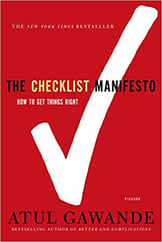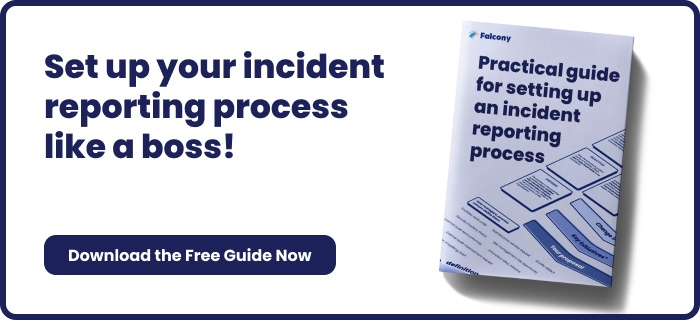Book Summary: The Checklist Manifesto
Checklists improve outcomes without adding skills. That's a bold statement as making a checklist seems relatively simple. The effects of checklists, however, are far from basic.
In the book, The Checklist Manifesto: How To Get Things Right, Dr. Atul Gawande lays out exactly how and why checklists save lives: by helping you to avoid failure.
While he focuses on the medical field, his manifesto on this powerful solution can be applied to almost every field. Here, we’ll summarise the 3 important lessons we took away from this book.
1. Checklists will help you to avoid failure
Gawande explains why and how the use of a checklist can provide you with protection against common mistakes. Why? Because it sets out everything you need. It covers all the basics.
For example, think of baking a cake. You’ll buy the ingredients, but if you miss even one thing the cake won’t rise. You’ll have failed over a simple, easily-avoidable mistake.
So how do checklists protect against failure? Well, if you have a list of every key ingredient for success, and you follow it to a T, you won’t miss anything that could have serious consequences. It’s as simple as that.
2. Checklists instil a culture of discipline and teamwork
This brings us to the second important point we took from this book: performance, and indeed performance standards, will increase with the use of checklists.
If you have a list of all the things you need to do or complete and make a habit of checking things off, you will get used to doing this. It creates a framework that everyone can work from and sets goals to work towards.
This creates a disciplined work environment and a culture for future success. It sets a standard for teams and ensures everyone knows their role and what they need to do.
Checklists allow for responsibility and accountability, enhance communication, and ensure the essentials are always, always covered. The result? Peak performance.
3. Checklists can be applied in different ways
Although the book focuses on the medical field and surgery. It is, however, stressed that checklists can be beneficial for almost every occupation.
The Checklist Manifesto tells us that there are two kinds of checklists: the “READ-DO'' checklists, which works a bit like a recipe where you go through the list point by point. And the “DO-CONFIRM" ones (commonly used in aviation), which are based on tasks completed from memory. Depending on your profession, the kind of checklist you use will differ.
The key to a checklist, no matter what kind, is to keep it short and simple. Focus on the vitals: keep it straightforward. Almost every kind of business can benefit from this. And, if for some reason it doesn’t aid you, leave it.
The main goals of checklists are to help you avoid failure and instil a new culture and framework for success. This should only be applied if it works for you, and if it does, the book encourages you to embrace this.

The Checklist Manifesto by Dr Atul Gawande. Available for purchase in Amazon.
Final Thoughts
Gawande’s book sets out the importance of a plan, and we at Plan Brothers certainly believe in this manifesto.
Checklists are very powerful tools that can contribute to the success of all sorts of tasks, processes, and projects. You can apply them to anything to ensure you meet your goals and cover all the basics.
If your organisation is looking for a tool to manage checklists, conduct inspections and audits in the ever evolving and changing world, have a look at audits.io. It enables you to better involve your staff in processes, learning from failure, create clarity on non-conformities, prevent and decrease the amount of friction in cross-team communications, and gather actionable data while doing these.
Are you interested to hear more? Have a look at Falcony | Observe to see how we can help your organisation.
We are building the world's first operational involvement platform. Our mission is to make the process of finding, sharing, fixing and learning from issues and observations as easy as thinking about them and as rewarding as being remembered for them.
By doing this, we are making work more meaningful for all parties involved.
More information at falcony.io.

Related posts
Safety Effects of Property Maintenance
The effect that property maintenance has on the safety of the users of the property is...
12 Common Checklists Used in Real Estate and Property Management
In the intricate world of real estate and property management, efficiency and attention to detail...
Tenant Portals Improve Lease Renewal Rates
Maintaining high lease renewal rates is essential for property owners and managers seeking to...





